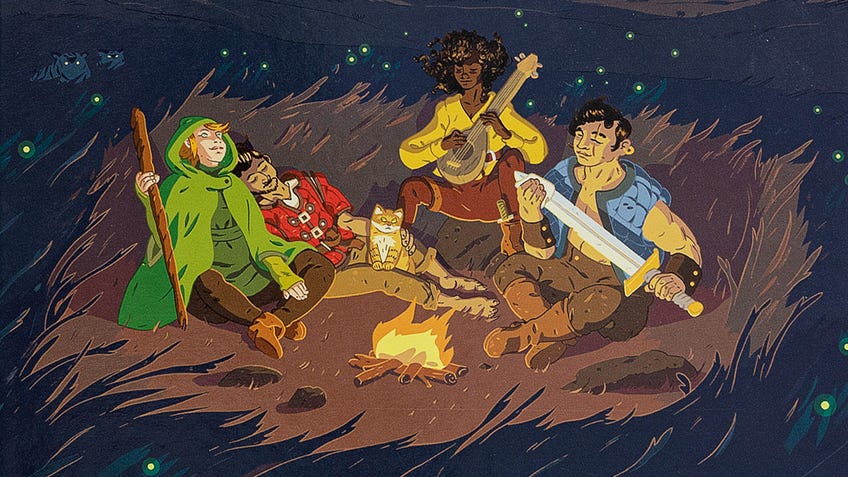Game of the Year 2019: Alex Meehan’s Top 5
A detective skulks into a bar on a quest to forge a key and eat a salad.
Alex Meehan is one of the Dicebreaker team’s illustrious staff writers and a firm advocate for sensible board game box sizing. She also helped to fill this very website full of words. Expect to find her lolling on a sofa whilst clutching a mince pie this festive season.
Having joined Dicebreaker earlier this year I’ve had the chance to play some bloody fantastic tabletop games. Here are five of the best board games I’ve gotten my hands on over the last 12 months.
1. Detective Club
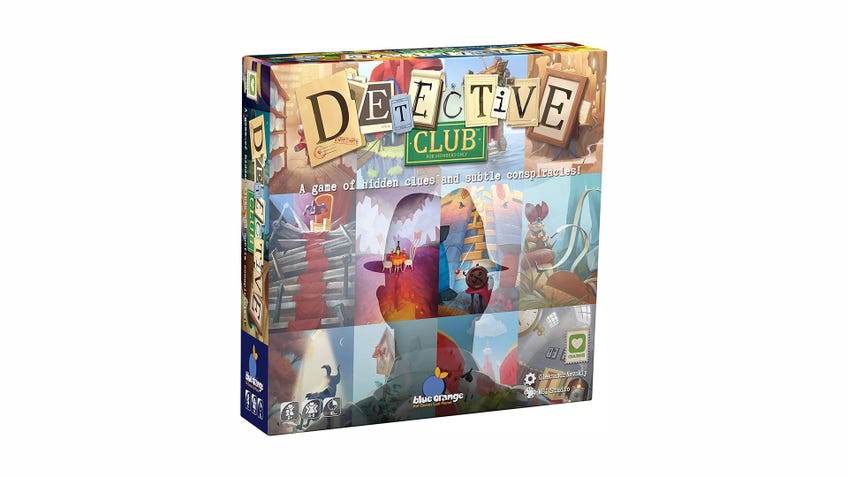
Although it technically made its debut in 2018, I first got my hands on Detective Club during this year’s UK Games Expo. Even in an event hall packed full with crowds the game had so much charisma. A little like Dixit - one of the best beginner board games around - each player gets a hand of storytelling cards showing some rather elaborate artwork and everyone then has to choose which cards they want to play depending on what will best fit with the chosen theme.
The twist here is that someone doesn’t know what the theme is, as every player but one receives a little notebook containing the storyteller’s chosen word. The person who gets the empty book is that round’s conspirator, and they’ll need to put on their best poker face if they don’t want to get caught by the other players. As the storyteller chooses their cards first the conspirator can play similar cards in an attempt to pass off as an ordinary player. Meanwhile the other players, safe in the knowledge that they know the chosen theme, just need to pick something that works. Which may seem simple enough, but sometimes you’re dealt absolute garbage that has no connection with the theme whatsoever - and that’s when things get complicated.
This is easily the best part of Detective Club, because once all the cards have been chosen players then have to take it in turns to explain why their cards are connected to the theme, with the overall goal of figuring out who the conspirator is. (Unless they are the conspirator, of course.) However, it’s not as simple as just picking out who sounds the least convincing or has the worst cards, because some people might have just been unlucky that turn and had nothing good to work with. But if you’re persuasive enough you might be able to talk your way into safety; for example, you could say that this mouse on a stump is related to the theme of finance as the mouse’s expression shows that they’re clearly considering lucrative future investments.
Combining the storytelling elements of Dixit with a social deduction game is a frankly genius idea, in my opinion, because they both involve a bit of gabbing and can result in some pretty hilarious moments.
Buy Detective Club on Amazon US.
2. Skulk Hollow
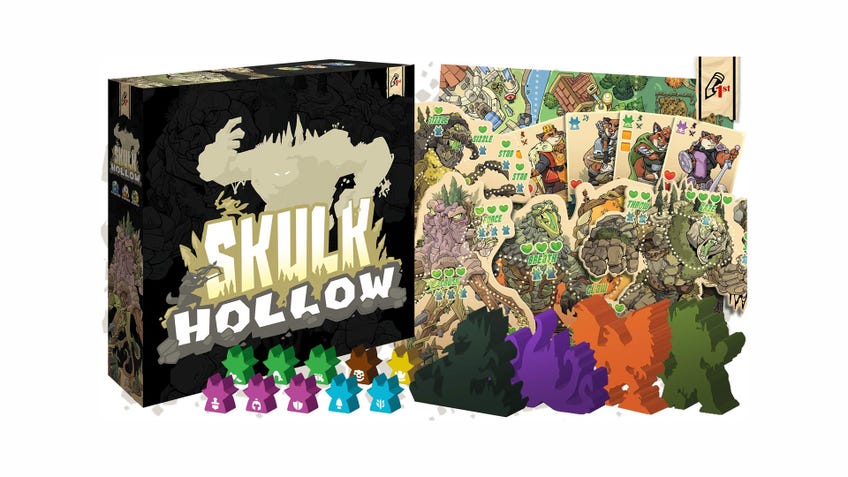
I currently share a flat with one other person so we’re often looking for good two-player games to occupy our time with. Enter Skulk Hollow. I stumbled across Skulk Hollow when helping Mr Whelan prepare for our video playthrough of the game and, initially, I wasn’t too impressed because it felt like the game was poorly balanced. However, it turns out that we were just playing it completely wrong (a mistake for which the blame lies almost entirely with Wheels) so all is forgiven.
In Skulk Hollow one player takes command of the brave Foxen kingdom whilst the other becomes a terrifyingly overgrown beastie a la video game Shadow of the Colossus. As the monster you’ll have access to an arsenal of abilities depending on which giant you decide to play as, along with different goals you’ll need to fulfill to win the game. For some creatures, like Gwark the stone bear, these objectives can be as simple as killing the opponents’ units, while for others it can be a little more complicated. If you play the Foxen kingdom you’ll get to choose from a selection of leaders, each with their own special power, and you’ll have to command a small army of foxes to attack the incoming behemoth. The way you do this feels incredibly epic because you have to command each of your foxy units to climb the monster and attack each of its limbs one by one until it’s finally felled.
Beyond its impressive David and Goliath asymmetry, Skulk Hollow is quite a tactical experience because each player has to use whatever is in their hand at the time, which may or may not be what they need. There are ways to draw new cards, but this can mean wasting an action you could potentially use to attack instead. The game can get really tense and I’ve had some incredibly clutch rounds during my time with it. Also, the art reminds me of Disney's Robin Hood film, which I really like, so that’s another plus.
Buy Skulk Hollow on Amazon UK/Amazon US.
3. Keyforge: Worlds Collide
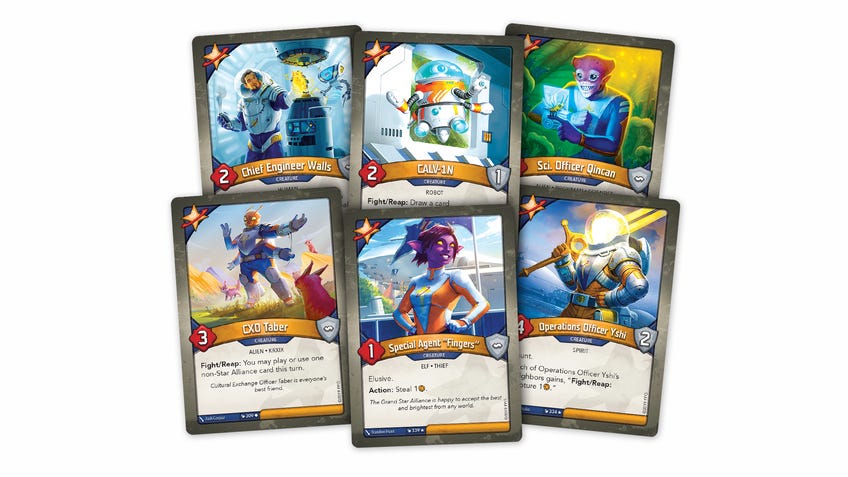
Trading card games like Magic: The Gathering absolutely terrify me - and not in a spooky sense, but more in how much time and money needs to be invested to play them. However, this year I discovered Keyforge's latest set, Worlds Collide, and, as such, found a competitive card game that isn't Magic: The Gathering that I could realistically get into.
Keyforge’s premise is incredibly appealing. Your goal isn’t to reduce your opponent’s hit points to zero, but to work towards building three keys. This kind of race-like setup allows for the creation of some really weird cards and room for loads of interesting strategies - although it is still satisfying to wipe your entire enemy’s board clean of minions. Certain mechanics found in card games like this can overwhelm newer players quite easily (myself included), but Keyforge feels inherently accessible because it does an excellent job of introducing new gameplay rules as and when it needs to.
The different Keyforge houses are exceptionally well designed. Each feels very unique, with every suit of cards providing players with a different way to approach the game. It’s not just in the creatures, upgrades and actions they use (though I love anything with goblins in it, so Brobnar is a top choice), but also the different flavours of the houses’ abilities. For example, whereas the Untamed house involves buffing lots of minions to dish out more damage, the Star Alliance house is geared towards gaining the precious resouce of Æmber quickly to help forge keys ahead of your opponent.
Perhaps the element of Keyforge I like the most is how each pack is entirely unique with no deck construction or meta involved; it just makes the game feel approachable in the best way possible. I just want to get on with learning how to play Keyforge without having to mess around with buying hundreds of card packs and creating decks people have posted on the internet. (Though if you are wondering how to build a Magic: The Gathering deck as a beginner, our straightforward guide is the place to start.)
Buy Keyforge: Worlds Collide on Amazon UK/Amazon US.
4. Quest
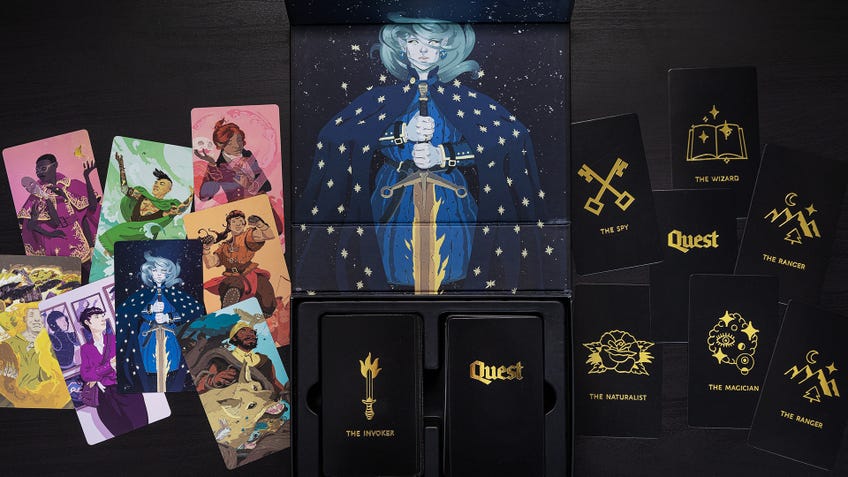
Finding time to play tabletop roleplaying games can be rather hard because I’m an adult and I have to do adult things like wash towels and cook pasta. Which is why I really appreciated the design philosophy behind Quest, a newly-released RPG that does away with a lot of the rules baggage that often turns me off from playing certain games. Quest keeps the experience stripped back to the core elements of what makes tabletop RPGs fun: storytelling and character development.
I have honestly never made an RPG character as fast as I did with Quest; it took me about 15 minutes because the rulebooks provide such clear instructions. Character creation in Quest is more about personality than it is about class or race. Sometimes it’s a struggle to create a character that you can actually enjoy roleplaying as, but Quest makes it absurdly easy to design someone relatable. There aren’t any set options for names, backgrounds, clothing or shapes - it’s all just whatever you can dream up. Which is why I made my Quest character a frumpy badger lady who uses paper fans and hairpins as rudimentary weapons.
Playing Quest is as blissfully simple as making a character, with everyone having exactly 10 action points available to cast whatever spells and abilities they have at their disposal. Players aren’t restricted to using a certain set of skills either, as you can choose to do literally anything you can think of and roll. My character conjured up an entire banquet of food, invited a group of guards for a feast and had a lovely time. And that’s just what Quest is: a properly lovely time.
Buy Quest directly from publisher The Adventure Guild.
5. Point Salad
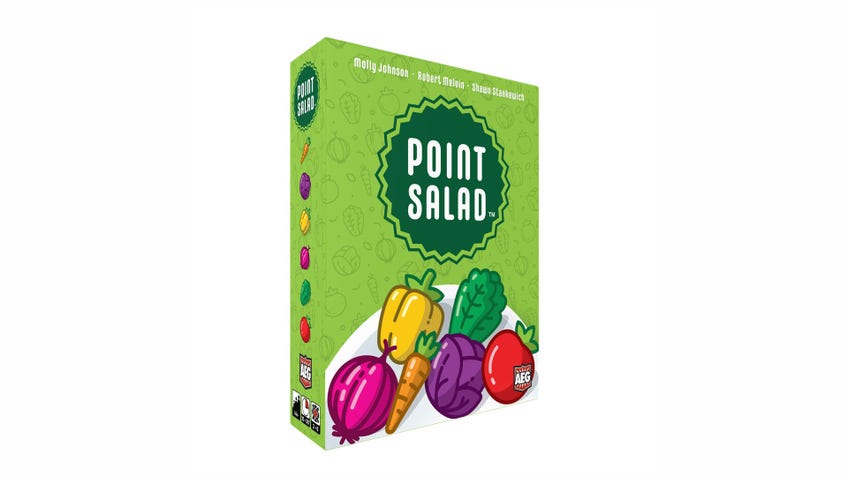
I love a good card-drafting game, as made evident by the amount of times I’ve played one of the best quick board games going, Sushi Go!, and boy is Point Salad an extremely fine card-drafting game. In fact, I’d say Point Salad could easily rival the likes of Sushi Go!, so there’s definitely a new kid on the food-themed card game block. Having listened to Dicebreaker's Alex Lolies spouting on and on about the game I gave it a go, and thus discovered an absolute banger of a party board game.
Playing Point Salad is as simple as choosing which delicious vegetable cards you want to start collecting, from a selection of cabbage, onions, peppers, carrots, tomatoes and lettuce. When you combine these with the appropriate point cards (which are actually the same cards flipped over) - for instance, a card that makes every one of your onions count for one point - then you can start gradually generating the highest score possible.
As cards can disappear from the central allotment between your turns, you will need to think quickly when selecting cards and be sure to have a backup plan should some terrible person take the cards you want. You’ll also have to decide whether to risk taking those cards that give you negative points for some vegetables (scary business indeed). Despite the game’s simplicity it’s easy to get really engaged because it’s such a fantastic experience that flows incredibly quickly and takes absolutely no time to set up. Point Salad is a definite pick for playing with friends and family during the holiday season, so I’d recommend trying your best to find a copy.
Buy Point Salad on Amazon US.
Read more of Dicebreaker’s Game of the Year 2019 coverage, including the Dicebreaker team’s personal favourites and more designer picks.
